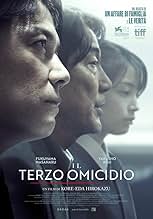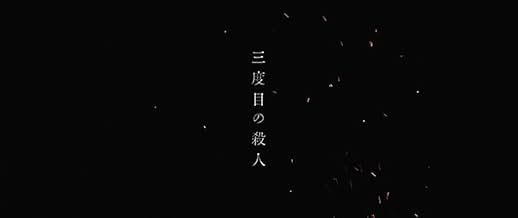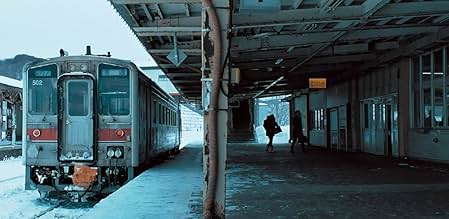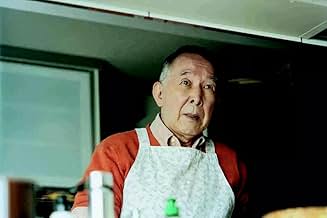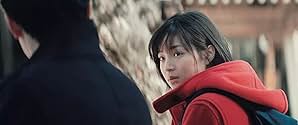AVALIAÇÃO DA IMDb
6,7/10
8,6 mil
SUA AVALIAÇÃO
Um drama judicial se concentra no assassinato do presidente de uma fábrica.Um drama judicial se concentra no assassinato do presidente de uma fábrica.Um drama judicial se concentra no assassinato do presidente de uma fábrica.
- Prêmios
- 6 vitórias e 17 indicações no total
Avaliações em destaque
The murderer in this film has killed twice. So, why is the film called 'The Third Murder?' It's up to the viewer to answer the question. In my view, the third victim is the truth. As one of the protagonists remarks in a crucial scene: 'No one has spoken the truth'.
'The Third Murder' is a film asking a lot of questions, but answering few. To be clear: that's a good thing. What is truth? What is righteousness? Which of the two are more important for a lawyer? And for a judge? Is capital punishment always wrong? Or, in the words of the killer: should some people never have been born?
With this film, acclaimed film maker Hirukazo Kore-eda takes a different path from many of his previous films. He is known for his delicate and subtle dramas about the family life of ordinary people. This time, he has made a sort of courtroom drama (although only a small part is actually set in a courtroom) about a killer and his possible motives.
Still, the theme of family relations is not absent in this film. Far from it, in fact. Fatherhood is omnipresent. One of the most important characteristics of the killer is how he has failed as a father. The lawyer defending him discusses the case with his own father, a retired judge who has convicted the same killer decades earlier. And the dead victim turns out to have been the worst father imaginable. At least, in one version of the truth.
'The Third Murder' is a multi-layered, complex film which offers lots of surprises and twists. Kore-eda succeeds in keeping the viewer wondering what comes next. But at the same time, the result is less convincing than in some of Kore-eda's best family dramas, in which human nature is dissected by small acts and symbolic details. Not by important, philosophical questions.
'The Third Murder' is a film asking a lot of questions, but answering few. To be clear: that's a good thing. What is truth? What is righteousness? Which of the two are more important for a lawyer? And for a judge? Is capital punishment always wrong? Or, in the words of the killer: should some people never have been born?
With this film, acclaimed film maker Hirukazo Kore-eda takes a different path from many of his previous films. He is known for his delicate and subtle dramas about the family life of ordinary people. This time, he has made a sort of courtroom drama (although only a small part is actually set in a courtroom) about a killer and his possible motives.
Still, the theme of family relations is not absent in this film. Far from it, in fact. Fatherhood is omnipresent. One of the most important characteristics of the killer is how he has failed as a father. The lawyer defending him discusses the case with his own father, a retired judge who has convicted the same killer decades earlier. And the dead victim turns out to have been the worst father imaginable. At least, in one version of the truth.
'The Third Murder' is a multi-layered, complex film which offers lots of surprises and twists. Kore-eda succeeds in keeping the viewer wondering what comes next. But at the same time, the result is less convincing than in some of Kore-eda's best family dramas, in which human nature is dissected by small acts and symbolic details. Not by important, philosophical questions.
With "The Third Murder" Hirokazu Koreeda sidepaths from the more lighthearted thematics his more recent movies like "our little sister" or "after the storm" had and reenters the realm of profound dramas in which he previously worked with in movies like "Like father like son" and one of his ealier works "after life". While the light hearted stuff is enjoyable and it is not as much of a risky "hit and miss" as a movie like "afterlife" might be, I think his more deep and serious movies are definitly more impacting and memorable, thats why I think "The third murder" is definitly one of Koreedas finest works.
In this crime thriller Koreeda explores heavily the ideas of truth, justice and especially motivation. Why do people say what they say? Can we really trust anyone? This movie was just so beautifully crafted with nearlly every scene you learn new things about character you thought you know already, just to find out how wrong you were, until you dont know what to believe anymore.
The cinematography was pretty unique to his other movies I would say. He added some emotionally driven music shots that fitted quite well with the tone of the movie and made some character interactions that were already tense and interesting even better by presenting interesting camera shots.
It was only fitting for Koreeda to give Masaharu Fukuyama the lead role given how well he did in "Like father like son" and he did a wonderful job again with this role. Also one of japans best actors "Koji Yakusho" did a perfect job, like most of the time and gave his role the exact nuance i was talking about previously, with being able to make yourself question your own judgement.
Overall I can only recommend this movie. Hirokazu Koreeda is one of Japans best living directos and "the third murder" is one of his best movies and I am already looking forward of rewatching this movie.
In this crime thriller Koreeda explores heavily the ideas of truth, justice and especially motivation. Why do people say what they say? Can we really trust anyone? This movie was just so beautifully crafted with nearlly every scene you learn new things about character you thought you know already, just to find out how wrong you were, until you dont know what to believe anymore.
The cinematography was pretty unique to his other movies I would say. He added some emotionally driven music shots that fitted quite well with the tone of the movie and made some character interactions that were already tense and interesting even better by presenting interesting camera shots.
It was only fitting for Koreeda to give Masaharu Fukuyama the lead role given how well he did in "Like father like son" and he did a wonderful job again with this role. Also one of japans best actors "Koji Yakusho" did a perfect job, like most of the time and gave his role the exact nuance i was talking about previously, with being able to make yourself question your own judgement.
Overall I can only recommend this movie. Hirokazu Koreeda is one of Japans best living directos and "the third murder" is one of his best movies and I am already looking forward of rewatching this movie.
I've just managed to catch up with this quite elusive film as I'm a big Akira Kurosawa film and from what I saw from the description and trailer, this would seem to be Koreeda's 'Kurosawa' film - there are obvious references to both Rashomon and High and Low.
The film indeed is clearly influenced by both those films, with a bit of Kurosawa's lesser known court drama Scandal thrown in. The plot follows a lawyer, asked by a colleague to assist with a seemingly straightforward capital punishment case. A middle aged man called Mizume is accused of, and has confessed to, the murder of a factory owner, and the theft of money. Mizume had only just been released after a long prison sentence for a previous murder. The lawyers job is to avoid the death penalty by trying to muddy the waters around the murder, and perhaps suggest it was an impulsive act and not planned (from what I can understand, Japanese law tends to have a range of gradations of homocide, with the judge ultimately deciding if it was serious enough for the death penalty).
The job of the lawyers is complicated by the apparent passivity of Mizume, and his constant changing of his story. At first, his explanations are just vague and contradictory, but he then states that he killed the man because he was paid by the mans wife to do so. As the main lawyer, Shigemora, digs deeper, he finds yet another possible motive.
I won't give away the ending, except to say that there is a 'probable' reason given in the end, but so many versions are given its not entirely clear what happened, or (seemingly the core question of the film) whether the truth is relevant at all to the operation of justice. Shigemora is caught in a Rashomon like situation of not knowing whether there is any one real truth, and whether knowing, or exposing, this truth is in any way relevant, morally, ethically or legally.
While the film sort of hedges the line between being a procedural and a more philosophical exploration of justice and truth (which reminded me a little of some recent Korean films such as Memories of Murder and Mother) the film also shows clear influence from High and Low as the main protagonist agonises over the guilty mans motivation, and starts to identify with him - shown rather allegorically in their prison conversations, with one face 'reflected' over another.
Rather like Kurosawa with Scandal and High and Low, the film seems to reflect the Directors concerns with the operation of justice in Japan, although those concerns seem pretty universal. In particular, the question of whether 'justice' and 'truth' are in any way compatible. Rather like Kurosawa's early films on the topic, the approach is perhaps a little too didactic for audiences not up to speed on the operation of the Japanese system.
As a film, I found it quite engrossing, while simultaneously a little frustrating. Koreeda is famous for a very deliberate, slow approach which in his best work absorbs the viewer into the life of his characters. Unfortunately, this type of film I think requires a more dynamic style, and the film is somewhat one-paced. Worse, it is hamstrung by some rather clunky didactic dialogue (the lawyer is followed everywhere by a young assistant, always asking stupid and naive questions which seem to have no other purpose than to explain to the audience what we are seeing), and some heavy handed metaphors. The two leads are good in the roles, but there is quite poor acting in some of the lesser roles - I think mostly due to the undercooked script and somewhat contrived plotting. I can't help feeling that Koreeda was trying to get something off his chest with this film, and found himself with a type of film making he's not really comfortable with.
So while the film is certainly quite gripping, and I found the insights into the Japanese court system very interesting, this is nowhere near the Directors best film. Its certainly worth anyones time with an interest in Japanese cinema to watch it, but be prepared I think to be a little disappointed if you are either a Koreeda fan (I certainly am), or for that matter, a Kurosawa fan.
The film indeed is clearly influenced by both those films, with a bit of Kurosawa's lesser known court drama Scandal thrown in. The plot follows a lawyer, asked by a colleague to assist with a seemingly straightforward capital punishment case. A middle aged man called Mizume is accused of, and has confessed to, the murder of a factory owner, and the theft of money. Mizume had only just been released after a long prison sentence for a previous murder. The lawyers job is to avoid the death penalty by trying to muddy the waters around the murder, and perhaps suggest it was an impulsive act and not planned (from what I can understand, Japanese law tends to have a range of gradations of homocide, with the judge ultimately deciding if it was serious enough for the death penalty).
The job of the lawyers is complicated by the apparent passivity of Mizume, and his constant changing of his story. At first, his explanations are just vague and contradictory, but he then states that he killed the man because he was paid by the mans wife to do so. As the main lawyer, Shigemora, digs deeper, he finds yet another possible motive.
I won't give away the ending, except to say that there is a 'probable' reason given in the end, but so many versions are given its not entirely clear what happened, or (seemingly the core question of the film) whether the truth is relevant at all to the operation of justice. Shigemora is caught in a Rashomon like situation of not knowing whether there is any one real truth, and whether knowing, or exposing, this truth is in any way relevant, morally, ethically or legally.
While the film sort of hedges the line between being a procedural and a more philosophical exploration of justice and truth (which reminded me a little of some recent Korean films such as Memories of Murder and Mother) the film also shows clear influence from High and Low as the main protagonist agonises over the guilty mans motivation, and starts to identify with him - shown rather allegorically in their prison conversations, with one face 'reflected' over another.
Rather like Kurosawa with Scandal and High and Low, the film seems to reflect the Directors concerns with the operation of justice in Japan, although those concerns seem pretty universal. In particular, the question of whether 'justice' and 'truth' are in any way compatible. Rather like Kurosawa's early films on the topic, the approach is perhaps a little too didactic for audiences not up to speed on the operation of the Japanese system.
As a film, I found it quite engrossing, while simultaneously a little frustrating. Koreeda is famous for a very deliberate, slow approach which in his best work absorbs the viewer into the life of his characters. Unfortunately, this type of film I think requires a more dynamic style, and the film is somewhat one-paced. Worse, it is hamstrung by some rather clunky didactic dialogue (the lawyer is followed everywhere by a young assistant, always asking stupid and naive questions which seem to have no other purpose than to explain to the audience what we are seeing), and some heavy handed metaphors. The two leads are good in the roles, but there is quite poor acting in some of the lesser roles - I think mostly due to the undercooked script and somewhat contrived plotting. I can't help feeling that Koreeda was trying to get something off his chest with this film, and found himself with a type of film making he's not really comfortable with.
So while the film is certainly quite gripping, and I found the insights into the Japanese court system very interesting, this is nowhere near the Directors best film. Its certainly worth anyones time with an interest in Japanese cinema to watch it, but be prepared I think to be a little disappointed if you are either a Koreeda fan (I certainly am), or for that matter, a Kurosawa fan.
One of the most psychologically and thematically complex autopsies of truth, ethics, and morality I've seen. It reminds me of Rashomon in some respects, except that much of the fluidity and subjectivity of truth in this movie is found within a single character, and within societal systems of "truth-seeking," i.e., the "justice" and legal systems. Even the camera movement in this film is perfectly attuned to those themes, subtly moving into, over, and out of scenes from all directions. Koji Yakusho is superb as usual, and all other acting and casting is excellent as well, as is the score and the editing. I will be thinking on this one for a while.
The great lawyer Shigomori accepts a delicate case, the defense of Misumi, accused of theft and murder. Misumi, who thirty years earlier had served a prison sentence for murder, is now facing the death penalty. Astonishingly, the accused does not seem to care at all about his lot, the best evidence being that he does nothing to help his defender avoid it.
A specialist in childhood and family relations, Kore-eda ventures here into unfamiliar territory, the judicial thriller. The film raises interesting questions about the relativity of justice while at the same time keeping up the mystery: why does the accused, whose guilt is far from being proven, play cat and mouse with his defender and put obstacles in his way when he does everything in his power to save him from being hanged? Unfortunately, too much chatter and slowness diminishes the effectiveness of the film. But there are undeniable good points : the subtle acting of the two main protagonists, the beautiful nostalgic music by Ludovico Einaudi as well as the end of the film, a little more tonic than what preceded it. Quite a fair work on the whole but not up to the level of " Nobody Knows " or " Like father Like Son ".
A specialist in childhood and family relations, Kore-eda ventures here into unfamiliar territory, the judicial thriller. The film raises interesting questions about the relativity of justice while at the same time keeping up the mystery: why does the accused, whose guilt is far from being proven, play cat and mouse with his defender and put obstacles in his way when he does everything in his power to save him from being hanged? Unfortunately, too much chatter and slowness diminishes the effectiveness of the film. But there are undeniable good points : the subtle acting of the two main protagonists, the beautiful nostalgic music by Ludovico Einaudi as well as the end of the film, a little more tonic than what preceded it. Quite a fair work on the whole but not up to the level of " Nobody Knows " or " Like father Like Son ".
Você sabia?
- CuriosidadesThis is the first fiction film from Hirokazu Koreeda that was shot in anamorphic digital and framed in 2.35:1.
Principais escolhas
Faça login para avaliar e ver a lista de recomendações personalizadas
- How long is The Third Murder?Fornecido pela Alexa
Detalhes
- Data de lançamento
- País de origem
- Centrais de atendimento oficiais
- Idioma
- Também conhecido como
- The Third Murder
- Locações de filme
- Rumoi Station, Rumoi, Hokkaido, Japão(the three lawyers arrive in Rumoi)
- Empresas de produção
- Consulte mais créditos da empresa na IMDbPro
Bilheteria
- Faturamento bruto nos EUA e Canadá
- US$ 89.315
- Fim de semana de estreia nos EUA e Canadá
- US$ 10.670
- 22 de jul. de 2018
- Faturamento bruto mundial
- US$ 13.411.936
- Tempo de duração2 horas 4 minutos
- Cor
- Mixagem de som
- Proporção
- 2.35 : 1
Contribua para esta página
Sugerir uma alteração ou adicionar conteúdo ausente

Principal brecha
By what name was O Terceiro Assassinato (2017) officially released in India in English?
Responda

